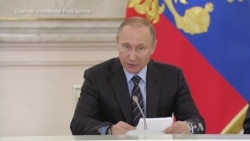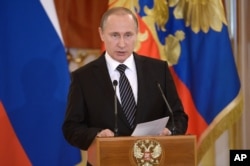People around the world have reacted with shock and outrage to the trove of documents leaked from a law firm in Panama that revealed secret bank accounts connected to hundreds of public officials, politicians and celebrities. The list of notables includes the current leaders of Argentina, Britain, China, Iceland, Russia, and Ukraine, among others, or people closely linked to them.
But, while the Panama Papers named close friends of Russian President Vladimir Putin, and suggested Putin himself might be involved, the reaction of the Russian public has been muted.
While thousands of people protested outside the prime minister’s office in Reykjavik Monday demanding Prime Minister Sigmundur David Gunnlaugsson’s resignation, a mere three demonstrators showed up outside the Russian parliament building in Moscow Tuesday, and they were quickly detained.
The fact that even such a small public protest was quickly silenced comes as little surprise to political analysts, who say authorities are taking no chances with parliamentary elections scheduled later this year.
Russians See Corruption as Permanent
The Russian public's general apathy to the Panama Papers' allegations of high-level corruption may perplex some outside observers.
A public opinion poll released Wednesday by the independent Levada Center sheds some light on Russian thinking on the issue. It shows that while 56 percent of Russians think that corruption and bribery can be reduced, only 15 percent say it can be eliminated while 24 percent believe it is permanent.
The poll was conducted in February, before the Panama Papers leak was made public.
The Levada Center’s Alexei Grazhdankin says Russians do not so much tolerate corruption as accept the idea that little can be done about it.
“On the one hand, these revelations do not add anything new to what is known by the part of the Russian public that takes an interest in it, as compared to the information that has been published in reports by [the late opposition leader] Boris Nemtsov and his co-authors and in the materials by the Anti-Corruption Fund of [opposition blogger] Alexei Navalny,” he tells VOA. “And, moreover, it is ‘expected’ of the authorities because of the belief that corruption can't be rooted out in Russia."
State Media Control
While Russians have to deal with everyday corruption - paying bribes to avoid tickets from traffic police, to get decent care in hospitals, and to more quickly navigate the state bureaucracy - they rarely get a glimpse of high-level corruption.
Most Russians get their information from ubiquitous Russian state media, which all send the same message, designed to show officials, especially at the very top, working hard for Russia. As Western media, and the few independent media in Moscow, were awaiting the revelations of the Panama Papers, the Kremlin prepared the public by announcing an expected “information attack” against Putin and his associates. Meanwhile, Putin confirmed a proposed National Anti-Corruption Plan for 2016-2017.
“One must remember that during 16 years of Putin's rule a certain image of Russian power was formed in the mass consciousness,” Grazhdankin tells VOA. “Putin is perceived not as a key figure in the corrupt system of Russian power, but as a separate element above it, that does all in his power to curb corruption in Russia.”
Russian state media gave only dismissive coverage to the Panama Papers, portraying them as part of a Western conspiracy to diminish Russia by any means necessary. According to Grazhdankin, most Russians buy into this conspiracy theory.
“Under the present confrontation with the West, they are interpreted by most Russians as ‘anti-Russian propaganda’ and the attempts of the West to discredit Russia,” he said.
Russia to Investigate Allegations?
The Russian Prosecutor General’s Office told the Interfax news agency it plans to investigate the data in the leaked documents to see if any Russian laws or international commitments were broken.
But few, if any, expect cases to be brought against the Putin loyalists named in the report.
"The explanation of this is, well, very simple too,” says Ekaterina Schulmann, a political scientist at the Russian Presidential Academy of National Economy and Public Administration.
"We don't have an independent judiciary, we don't have independent prosecutors, and we don't have a full-potential parliament that can conduct a parliamentary investigation, which would be a natural thing in a parliamentary democracy, but not in today's Russia,” she told VOA.
Schulmann says the mounting allegations against top officials, combined with Russia’s worsening economy, could eventually accumulate negative sentiment among the public.
“It was easy to be tolerant to officials living the good life if your own wages were getting higher and higher with every year, your standard of living was getting better and better,” she says. “But now, when the trend is exactly the opposite, this type of information will grate on peoples' feelings more and more.”
Channeling Mass Discontent
The World Bank on Wednesday downgraded its economic forecast for Russia in 2016, from a 0.7 percent to a 1.9 percent contraction, and warned that more than 15 percent of the population could be living below the poverty line by 2017.
But the Levada Center’s Grazhdankin says it would take a much worse collapse of the economy to convince Russians to turn on their own leaders.
“If the downfall is not catastrophic, the authorities will have enough resources to channel mass discontent into something else,” he says. “Especially because international tensions grow and [authorities have] campaigns connected with the search for ‘internal enemies’ and ’fifth columnists’ that open up impressive opportunities, with propaganda going on for a few years now.”
Grazhdankin says the worse the situation in Russia becomes, the more ire the Kremlin will direct at its critics and opponents before finally looking at scapegoats within the ruling class.
“All routes for escape are already prepared,” he concluded.







